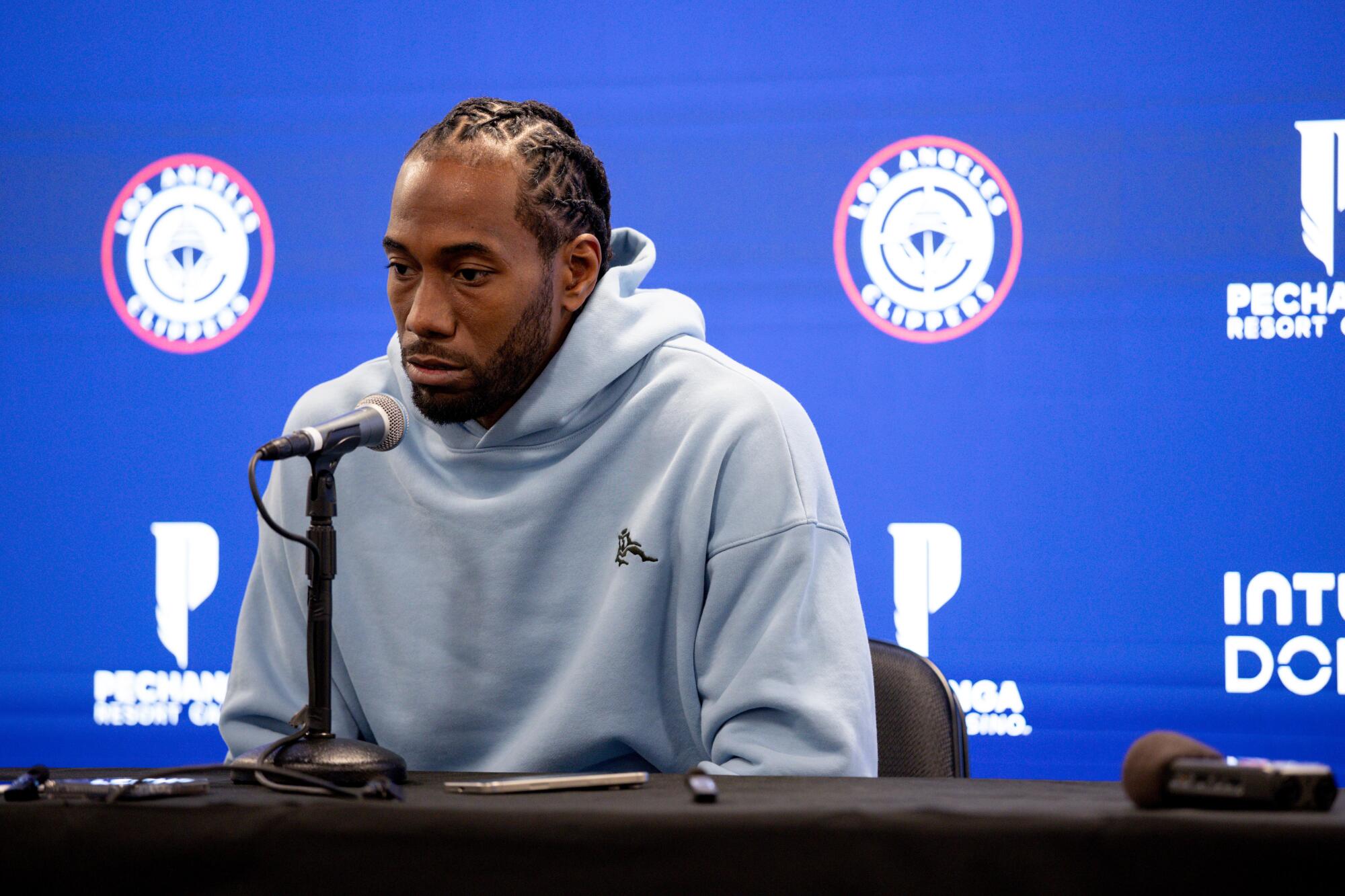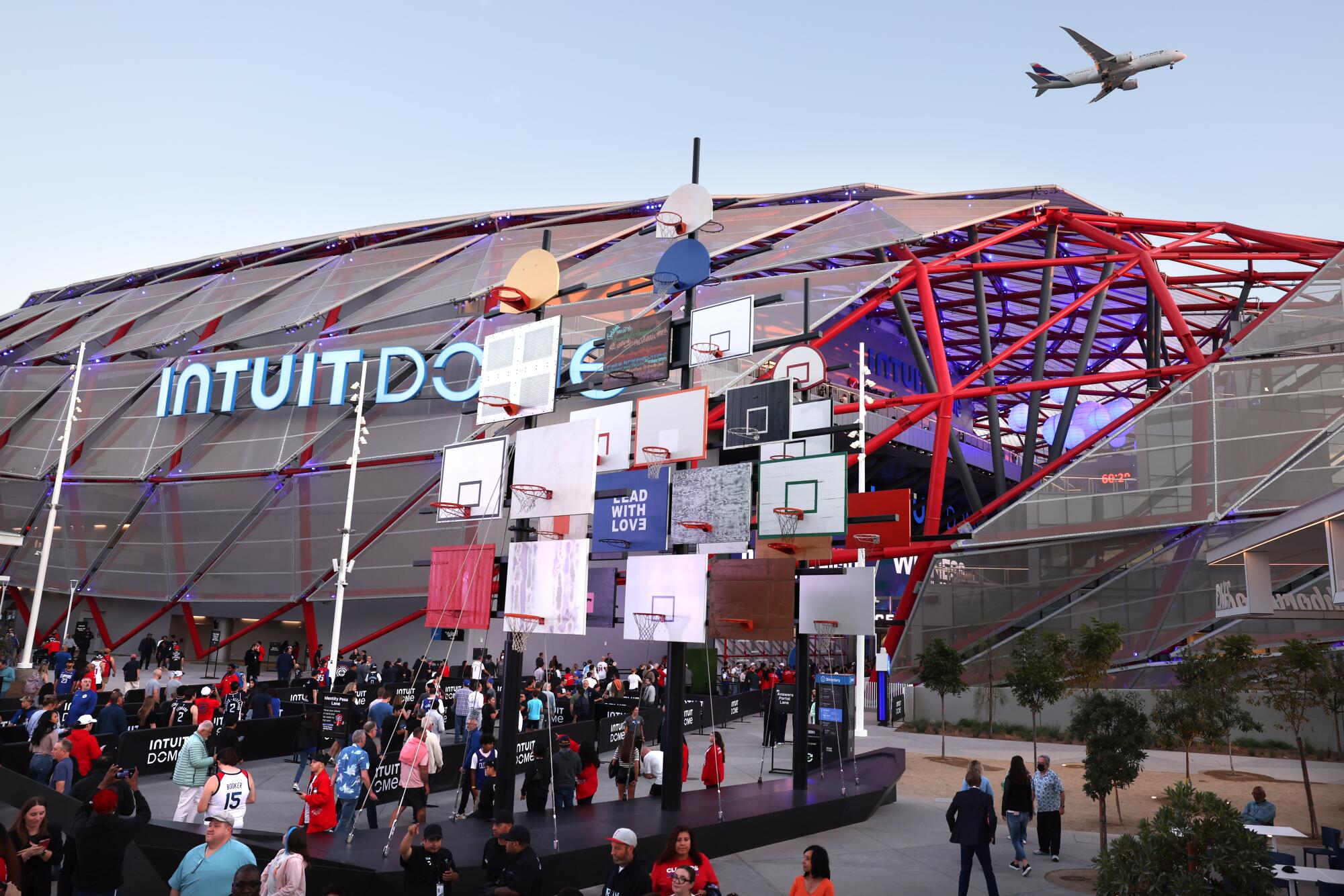Clippers’ Kawhi Leonard denies his endorsement deal was cheating
Kawhi Leonard mumbled his way through a few answers to questions Monday about his endorsement deal with Aspiration Partners that has triggered an NBA investigation into whether the Clippers circumvented the league salary cap.
The Clippers allowed only two reporters to ask about the deal during media day at Intuit Dome, refusing to give the microphone to additional reporters — including one from The Times — who raised their hands to ask questions. Leonard was ushered off the dais and out of sight.
“The NBA is going to do their job,” Leonard said. “None of us did no wrongdoing and, yeah, that’s it. We invite the investigation.”
Asked about his understanding of the endorsement deal and whether he performed any services, Leonard replied, “I understand the full contract and services that I had to do. Like I said, I don’t deal with conspiracies or the click-bait analysts or journalism that’s going on.
“I don’t think it’s accurate” that he provided no endorsement services to Aspiration, he said. “It’s old. This is all new to you guys. But the company went bankrupt a while ago, so we already knew this was going to happen.”
He added that he wasn’t paid all the money due to him, saying “I’m not sure [how much I’m owed]. I’ve got to go back and look at the books. … The company went belly up and it was fine.”
Clippers forward Kawhi Leonard speaks during media day at the Intuit Dome on Monday.
(Eric Thayer / Associated Press)
Lawrence Frank, Clippers president of basketball operations, was insistent that the investigation will exonerate owner Steve Ballmer and the franchise.
“We appreciate that there will be a clear-eyed look at these allegations,” Frank said. “And we are eager for the truth to come out.
“The assumptions and conclusions that have been made are disappointing and upsetting. And we expect the investigation will show that these allegations are wrong.”
The salary cap limits what teams can spend on player payroll to ensure parity and prevent the wealthiest teams from outspending smaller-market teams to acquire the best player. NBA Commissioner Adam Silver has called attempts to circumvent it a “cardinal sin.”
In this case, Leonard agreed to a $28-million contract for endorsement and marketing work for Aspiration, which went out of business in March. Players are allowed to have separate endorsement and other business deals. At issue in this case is whether the Clippers participated in arranging the side deal beyond simply introducing Aspiration executives to Leonard.
The most painful penalties the NBA could impose would be suspending Ballmer for a maximum of one year and docking the Clippers their first-round draft picks for up to five years. The team already is without a first-round pick in 2026 and 2028, having traded them away. Forfeiting the remaining picks through 2032 would make it harder for the Clippers to compete for their first-ever NBA championship.
“I hurt for Steve,” Frank said. “He’s one of the best people, most honorable people I’ve met. He does things the right way for the right reasons. And he constantly reminds us to stay on the right side of the rules.
“I also hurt for our players, our staff and fans. And, on a larger level, as I’ve learned about this over the past month, I feel bad for all the people defrauded by [Aspiration].”
Frank said a partition exists between team executives and companies that signed players for endorsements.
“Endorsement contracts are completely separate from player contracts,” he said. “So what a player makes, Kawhi, or any of our other players, in endorsement contracts, I have no idea.”
Ballmer, however, had a 2-3% ownership share in Aspiration and made separate investments of $50 million and $10 million in the company. Whether that same partition applied to him is something NBA investigators will examine, according to Michael McCann, a visiting professor of law at Harvard who has followed the situation closely.
Frank emphasized that the Clippers front office takes the salary cap rules seriously.
“The salary cap governs everything we do,” he said. “Our mission every day is to build the best team we can under the constraints of the cap. There is no gray area. There are no secret shortcuts. It’s clear what we are and are not allowed to do.”
Whether Leonard was as clear about the rules remains unknown. The forward who is under contract for two more seasons and $100 million said the upcoming season is all he’s thinking about.
“I’m not getting into any conspiracy theories or anything like that,” he said. “It’s about the season and what we’ve got ahead of us right now.”

